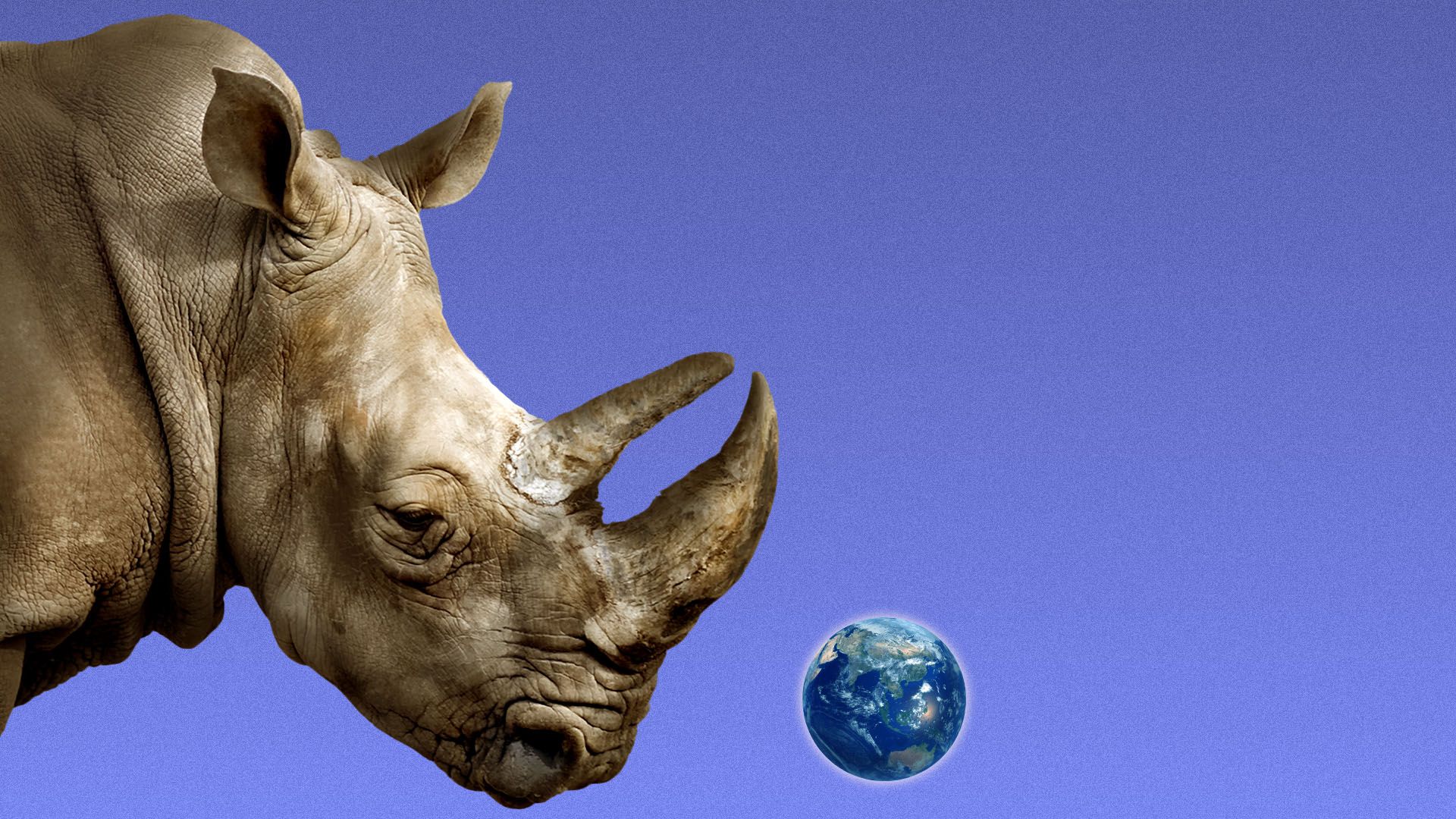
Forget black swans. We’re getting run over by two gray rhinos: coronavirus and climate change.
The intrigue: A gray rhino is a metaphor coined by risk expert Michele Wucker to describe “highly obvious, highly probable, but still neglected” dangers, as opposed to unforeseeable or highly improbable risks — the kind in the black swan metaphor.
The big picture: The novel coronavirus spreading infections and fear around the world is prompting black swan references from the media and investors alike, as is climate change’s impact on financial markets.
- But epidemics like the coronavirus and the slower burn problem of global warming are actually gray rhino risks, because there have been plenty of warnings for those who were paying attention.
Why it matters: Understanding what kind of risk you are facing — as an individual, country, company or world — is essential to make sure you’re prepared before, during and after a moment of crisis. Mistaking a gray rhino for a black swan suggests you’ll be ill prepared.
Where it stands: For most people on the street — or a cruise ship — it’s probably OK if they haven’t been paying attention until now to a potential epidemic.
- But governments, companies and experts around the world should have seen it coming because epidemics are not new and are likely to become more common, Bill Gates says. Other experts agree, per the WSJ.
- In the same vein, it’s OK if individuals aren’t losing sleep trying to cut their own carbon footprint — but governments, financial institutions and companies should be taking action, both to adapt to an inevitably warmer world and to reduce heat-trapping emissions.
- While some entities are beginning to, the action is uneven and slow considering scientists identified the problem decades ago.
On both fronts, a lot of governments, and especially the U.S. government, appear to be at best unprepared and at worst habitually dismissing these gray rhinos.
- The Trump administration dismantled a global health security unit years ago and drastically cut the Centers for Disease Control and Prevention’s global health section, per my colleague Bryan Walsh’s recent reporting.
- Trump is working to unravel virtually everything Barack Obama did on global warming, while climate risk is barely breaking through at diplomatic gatherings since Trump won the White House.
Yes, but: While coronavirus and climate change are both gray rhino risks, their differences explain why the world — and stocks and oil prices — are suddenly in tailspins.
- Coronavirus is a more immediate threat, and the amount of uncertainty surrounding it feels limitless. We don’t know how many people in any given area are infected, and because we don’t know that, questions persist about the accurate mortality rate.
- Climate change is one massive systematic risk that will unfold over decades and centuries. It increases the risk for an infinite number of distinct weather events and patterns.
- While a lot of uncertainty persists here, scientists are getting better at pinpointing increasing risk. To wit: Australia’s bushfires were made at least 30% more likely due to human-driven climate change, a global team of scientists said last week.
Risks rarely come in isolation or operate in a vacuum. There's the risk of unintended consequences responding to an initial risk.
- Our globally connected world already risks grinding to a halt and having a series of repercussions as coronavirus infections grow.
- In the same vein, if the world drastically slashes use of fossil fuels, energy costs could spike and cause economic crashes and more inequality.
- There’s also competition for attention among risks. Fears over the coronavirus are already slowing key diplomatic meetings on climate change ahead of a highly anticipated year-end summit.
- While no less urgent or important, climate change is a slower moving risk, so it inevitably — and understandably — gets put on the back burner when millions of people are at risk of dying from a virus outbreak in the coming months.
The bottom line: So what happens when you have multiple gray rhinos coming at you? A group of rhinos is, perhaps fittingly and alarmingly, called a crash.







